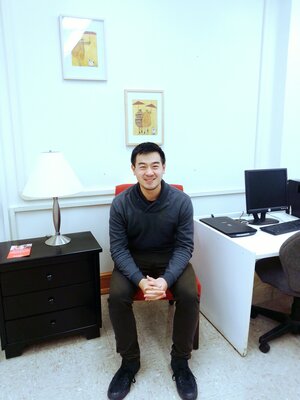
CS+Anthro senior, Austin Sun is set to graduate in May from the revolutionary and interdisciplinary combined major. He navigated his program with professional focus, but also a commitment for better, socially responsible technology.
A rapidly increasing number of employers seek graduates in human-centered design, the ethical challenges in data science and social network theory.
Q: Why did you choose the U of I?
The University of Illinois offered an amazing opportunity to pursue a unique major at a strong program and experience life in a new, unfamiliar area. Despite being unsure of my collegiate interests, the versatility and diversity of the school impressed me and inspired confidence that I would be able to find activities and interests that mattered to me. As I prepare to graduate, I'm truly thankful in so many ways for my decision to choose the University of Illinois Urbana-Champaign!
Q: Why did you choose the CS+Anthro major?
The CS + Anthro major appealed to me as the rare mix of a robust computer science education with a vigorous social sciences curriculum. I've always been more passionate about the impact of technology both on individuals and society-at-large. This major would give me a better understanding of the dynamics within cultures and societies to design and ideate technology for.
Q: After four years of college, how do you feel the CS+Anthro major moved your career goals forward? Have your career goals remained the same or been altered during this time?
The CS + Anthropology has moved my career forward in a unique way. I've been afforded the same respect from technical recruiters and was able to land several Software Engineering Internships(LinkedIn, Convoy, UnitedHealth Group) while also being exposed to opportunities of technical work in the social sciences sector. I've also been able to explore areas of product design, including both user research and user interface design. My career goals have shifted as my education progressed, changing to care more about the details of the societal impact of my work rather than the type of technical challenges I am working on.
Q: What were your favorite classes altogether? Can you talk a bit about them?
My favorite Anthropology classes were Social Media and Digital Communication(Anth 372) with Professor Jenny Davis, in which we were able to take an ethnographic and contemporary approach to examining details of language and media in the digital domain, and Ecology and Human Health(Anth 361) with Brian Allan, in which we studied the dynamics of infectious diseases and global change associated with diseases. Anth 372 was my first anthropology class about technology, and I really enjoyed taking an anthropological analysis of online social systems. Growing up, I always had an interest in biology and ecology, and Anth 361 gave me the opportunity to take a fascinating class on that topic while fulfilling my Anthropology requirements.
My favorite classes altogether have been Human-Computer Interaction for Machine Learning. In that, we examine the close interaction between machine learning and the people they serve. In Social Visualizations, we explored topics such as visualization of social data and social network theory. Another memorable class was Mobile Interactive Design, in which I learned about the complete design process of mobile applications, from diverging with user research to converging in on high-fidelity designs and implementing android applications.
Q: What are your plans after graduation?
Post-graduation, I am going to pursue a one-year Master's in Computer Science with a research focus in Human-Computer Interaction. Afterward, I plan to join a technology company to work on consumer-facing products as either a Software Engineer or Product Manager.
Q: What would be your advice to students considering a CS+Anthro major?
Enroll! CS + Anthro major combines a robust technical education mixed with a powerful knowledge of the social sciences. While I received the same great computer science fundamentals as pure CS students, I was, at the same time, able to augment that training with personalized, intriguing coursework about the past behavior and interactions of humans with machines.